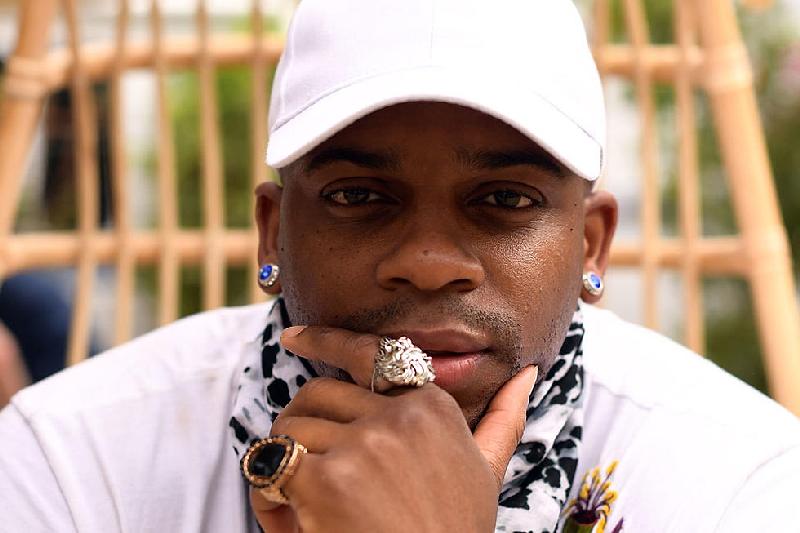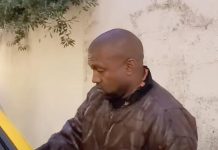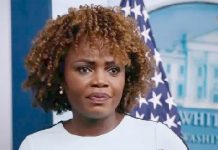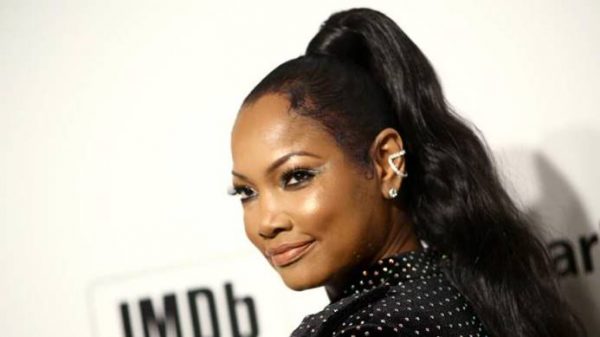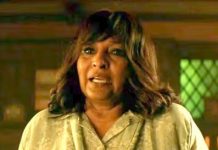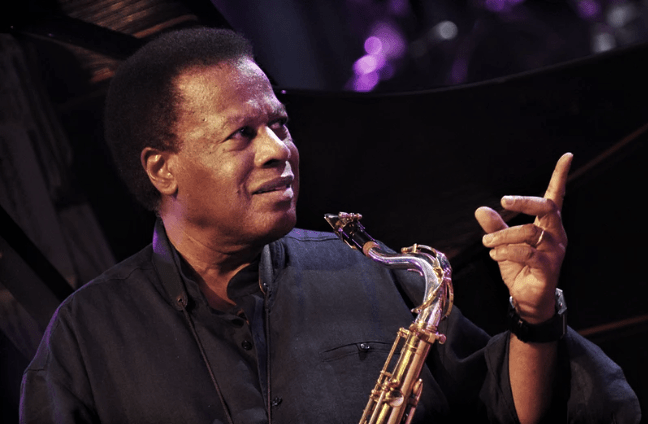
*“Wayne Shorter, my best friend, left us with courage in his heart, love, and compassion for all, and a seeking spirit for the eternal future. He was ready for his rebirth. As it is with every human being, he is irreplaceable.” – Herbie Hancock
Composer, saxophonist, and visionary Wayne Shorter resides in the upper reaches of all-around mastery within the art form of music and, specifically, in the genre known as ‘jazz’ – a term Shorter deflected as a rule yet in later years defined as the musical improvisational/compositional idiom that says, “I dare you!” Earlier this year on March 2, Shorter physically departed this planet after 89 years of peerless productivity as an artist and inspiration as a human being.
Tonight, Wednesday, August 23, 2023 – two days shy of what would have been Shorter’s 90th birthday – Herbie Hancock, his best friend, and comrade in musical possibility and audacity, is leading an astounding assemblage of musicians who were colleagues, disciples, students, friends, and ‘family’ in honoring the man’s legacy in the artform, and their abiding love and respect for him as a man.
This once-in-a-lifetime concert under the stars at the Hollywood Bowl precedes the broadcast debut of Ms. Dorsay Alavi’s documentary, “Wayne Shorter: Zero Gravity,” streaming on Prime Network this Friday, what would have been Wayne Shorter’s 90th Birthday.
These artists, in alphabetical order, are listed in the flyer below the photo of Herbe and Wayne:
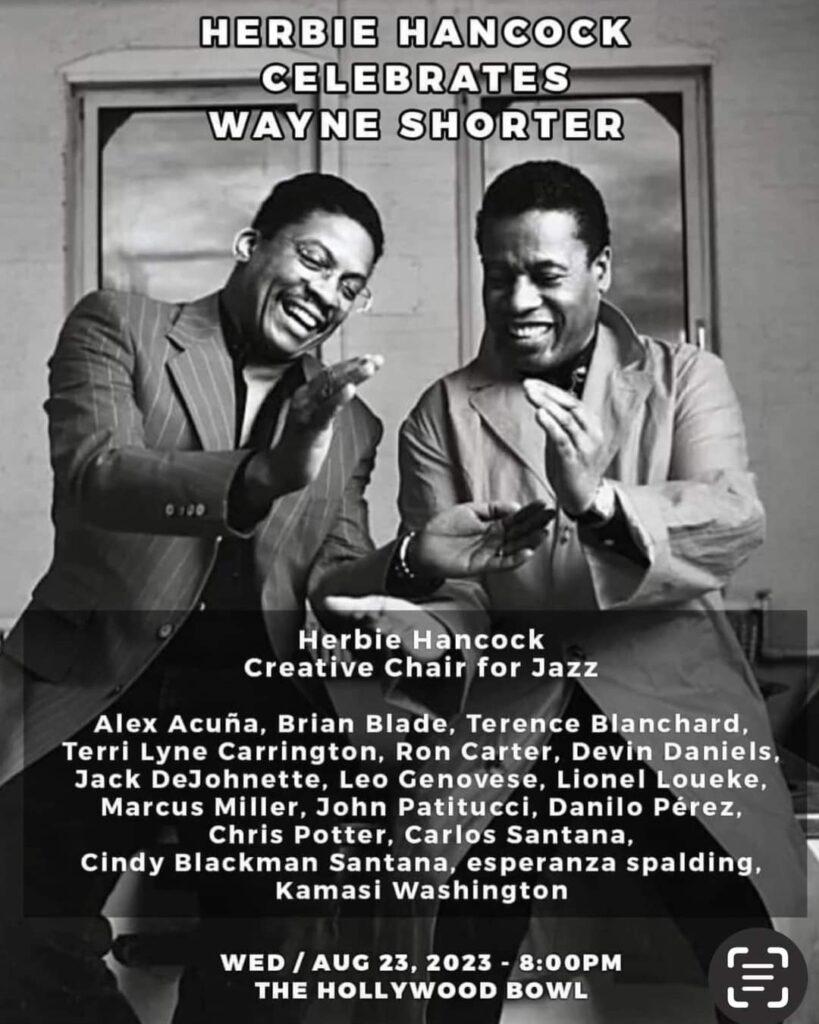
Wayne Shorter was one of not just Jazz’s but all music’s greatest, most prolific, and searching players and composers… From Art Blakey’s Jazz Messengers to the second great Miles Davis Quintet to Weather Report, monumental guest recordings with Steely Dan, Joni Mitchell, and Milton Nascimento, the V.S.O.P. and Miles Davis Tribute bands, plus all his own recording projects on Blue Note, Columbia, and Verve throughout. We will never see or hear his likes again. The international and universal reach of his music stretches fluidly – sans tentacle nor tangent – into the cosmos.
I was blessed to have seen him in the `80s with Weather Report at The Beverly Theater for the Domino Theory album…many of his bands at House of Blues, Royce Hall, and more…with Herbie as a duo at the Pasadena Civic Auditorium, and with the one night only super band, Mega Nova (Marcus Miller, Herbie Hancock, Carlos Santana, Cindy Blackman Santana, and Wayne). I wistfully remember Wayne’s 80th Birthday concert at the Hollywood Bowl highlighted by his quartet with the Imani Winds and preceded by the trio ACS (pianist Geri Allen, drummer Terri Lyne Carrington, and bassist Esperanza Spalding) spinning his compositions into silken treasures. Most tremendously, I saw the Miles Davis Tribute Band (Wallace Roney, Wayne, Herbie, Ron Carter, and Tony Williams) twice: once at the Hollywood Bowl where they played the Davis canon-like chamber music then a week later at the supper club The Strand in Redondo Beach where they blew the rafters off the joint for two consecutive sets!
I was pleased to be present to give Shorter a standing ovation when he received a 2018 Grammy for his 3-disc graphic novel-inspired project…Emanon! I will never forget teary-eyed bassist John Patitucci wheeling Wayne out to the podium – flanked by drummer Brian Blade and pianist Danilo Perez – for him to address briefly yet animatedly all present with gratitude and a message of uplift.
I was blessed to conduct a one-on-one in-person interview with Mr. Shorter backstage at the Playboy Jazz Festival…just us two as I rode the wave of his stream-of-consciousness answers to my inquiries on inspiration and craft.
Lastly…I remember a beautiful evening at long-gone Le Cafe’ in Encino where Terri Lyne Carrington invited Wayne up to sit in with her. I was a couple of seats away from him in the intimate room and got a birds-eye view of his wife, Ana Maria, lovingly assembling his soprano saxophone for him before he took the stage, played it with exceeding beauty then returned it to his partner who cleaned and disassembled the horn, gingerly placing it back into its case. We all should be loved and honored by someone as such in our lifetime. Wayne Shorter deserved it all.
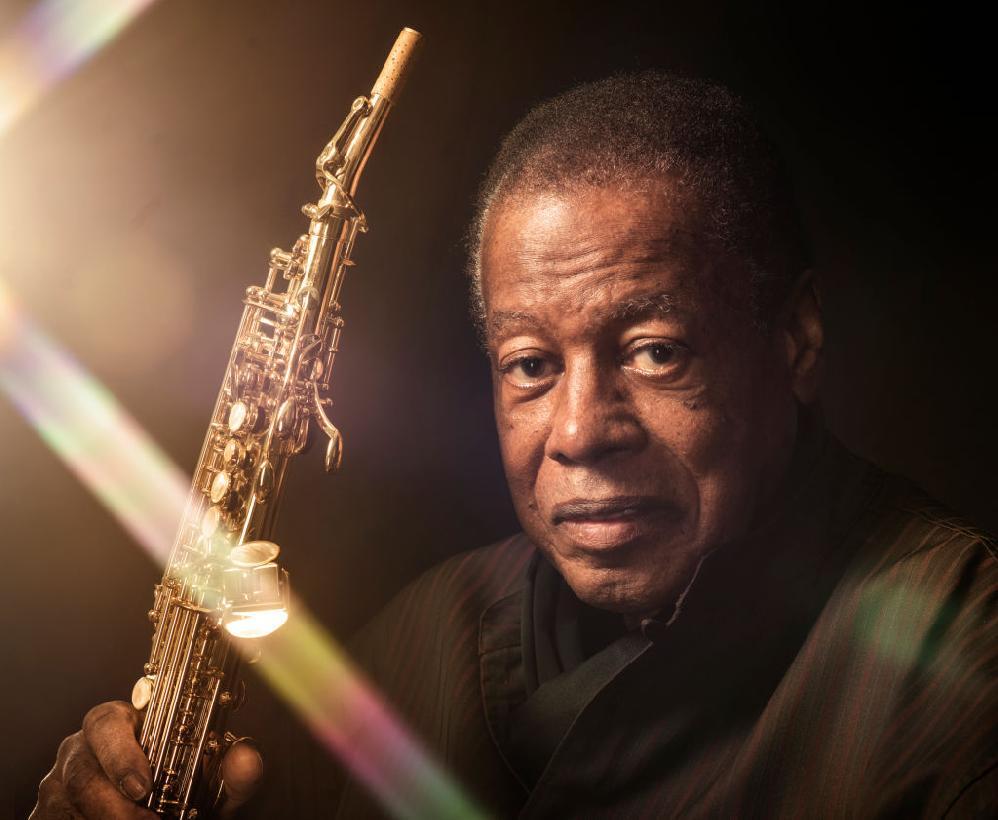
For all of this and more, I say, “Thank you, Captain Shorter, for every creation – spontaneous and composed.”
I had short chats with nine of tonight’s Salute to Shorter artists: Marcus Miller, Ron Carter, Carlos Santana, Terri Lyne Carrington, Cindy Blackman Santana, John Patitucci, Danilo Perez, Chris Potter, and Devin Daniels. What follows are edited responses to specific questions, several stemming from information shared above. I also asked them to share their Top 3 Favorite Shorter songs.
Danilo Perez – Pianist of The Wayne Shorter Quartet (2003-2023)
“When I was in Panama and deciding to continue music or (my studies), I heard “A Remark You Made” (from Heavy Weather by Weather Report). The way he played the tenor on that ballad was like he was calling me. I was 15-years-old and it was very powerful. When I came to the United States, I listened to Weather Report then the Miles Davis period then his records. He was like a galactic warrior – someone I never dreamed of playing with. I felt he was so beyond this planet.
When I met Wayne, I was on tour with Dizzy Gillespie. We were in the airport and I took a photo with him. You can tell from my face that I looked like I had just seen something transcendental. I was later recommended to him by (drummer) Terri Lyne Carrington. Playing with him from the first day, I already felt he was telling me things…reminding me to ask for the creative process to start – to get away from my comfort zone – very genius-like. Later our relationship grew more father and son-like. I remember asking him, ‘What should I be working on to improve?’ he said, ‘You need to get married.’ At first, I was not very happy to hear him say this to me. He told me, ‘You know what the definition of courage is? Staying married to one woman for the rest of your life.’ Years later, his (third) wife Carolina clarified for me what Wayne meant: ‘If art and music are about telling stories, you need to collect more stories in order to have more to say – to grow.” Today I am a proud husband and father of three children.
Wayne’s music is like beautiful poems. I feel he was writing the soundtrack for the FUTURE of his life…WAY AHEAD.”
Top 3: “High Life,” “When You Dream,” “The Three Marias”
Terri Lyne Carrington – Drummer
Wayne is one of the few musicians I did not meet early. I did not meet him until I was 20-21 – right before I started playing with him. Of course, I knew the records. His solo records but especially the stuff with Miles. It was a dream to meet him, audition, and get the job. His life, his compositions, and his playing all combined to make this magical, immensely gifted genius human being.
Many people have remarked about how special the ACS (Geri ALLEN, Terri Lyne CARRINGTON, Esperanza SPALDING) set was at Wayne’s 80th Birthday Concert. The Hollywood Bowl is one of my favorite venues but it’s not always an easy place to play. There’s the pressure, the sound, the timing, and the flipping of the stages. And sometimes the audience is just out there having a picnic with you as background music, I wrote a children’s book on how Geri, Esperanza and I got together called “Three of a Kind: The Allen Carrington Spalding Trio” (Authorhouse – 2022). The last drawing is of us at The Hollywood Bowl (illustrated by famed graphic artist Ramses) commemorating that performance.
Wayne was all about ‘Gender Justice’ before there was a term for it. He always supported women because he realized that’s the balance that is needed in life. And why would music and creativity be separate from life? When I first got the gig with him, the press was asking him about having two women in the band: me and percussionist Marilyn Mazur. He said that in the science fiction books and movies he loved, women and children were always in the forefront transforming things. So, for him, it was natural. What I love about that is a lot of women didn’t get the same opportunities that their male counterparts did for mentoring and access. Wayne was able to look at the potential in somebody – not expecting you to be fully formed – and believe in what can happen when you are given an opportunity.
[Terri, Esperanza and (keyboardist) Leo Genovese all played on the final album Wayne put out before he died: Live at the Detroit Jazz Festival. They will reunite with saxophonist Kamasi Washington joining them Wednesday at The Bowl.]
Top 3: “Infant Eyes,” “Elegant People,” “Someplace Called ‘Where’”
Marcus Miller – Bassist/Producer
“I’m a `70s kid. So, coming out of Funk, I next got into Return To Forever, Herbie Hancock’s Headhunters and Weather Report. I had no idea why they were playing what they were playing. Then Kenny Washington told me I had to go back and check out the history. They all led me to `60s Miles Davis. By 1977, I began to realize that Wayne Shorter was the closest thing you could get to a deity. The music he wrote for Art Blakey & The Jazz Messengers, for Miles Davis’ second great quintet, for Weather Report and his own albums – kids are studying all that progressive jazz music at the Berkely College of Music TODAY. He was also the icon for being endlessly creative yet simultaneously super advanced and childlike with his melodies. Conversations with Wayne were deep…on Stephen Hawking’s level in terms of his fascination with the world. And that’s what you hear in his melodies…they sound like sophisticated nursery rhymes. When we were recording, I had to have five music stands to hold all the sheet music…AND a chair with wheels!
Wayne was so creative… He showed me a sculpture of Nefertiti that I assumed he bought at a gift shop passing through Egypt. He said, ‘No, I did that.’
When I produced his album, High Life (Verve – 1995), we had an orchestra for some songs. Before the session, Wayne said, “I would like to address the orchestra before we record.” So, I got off the podium then Wayne got up and started describing a scene from this 1940’s movie. He said, “This is what I want to evoke in this piece.” Some of the musicians had some real question marks over their heads. At one point, we took a coffee break. One French horn player stayed behind and wandered into the control room to hear what all this craziness sounded like. All of a sudden behind me I hear, “OH, I get it. This stuff is way above our heads. This guy is a genius!” By the end of the three days, we all arrived at a nice place with it. The musicians found a respect for Wayne. And that made a difference. It’s up to the conductor to get the interpretation communicated to the orchestra, But it makes a big difference when the musicians are invested in something they can be proud to have participated in.
For the Mega Nova concert at The Bowl, Herbie, Carlos, Cindy, Wayne, and myself rehearsed once. Most of us wanted to get one more in the next day. Wayne said, ‘You cannot rehearse The Unknown!’ Who’s gonna argue with that?”
Top 3: “Footprints,” “Palladium,” “High Life”
Chris Potter – Saxophonist
“It’s hard to overstate Wayne’s influence. His whole approach to music has always been a guiding light for me – being your own voice as both a saxophone player and a writer. I discovered him through the Miles Davis Quintet records of the `60s. I was very familiar with Miles’ `50s quintet with John Coltrane and Philly Joe Jones. But I remember hearing Miles Smiles for the first time…and it scared me to death. A few years later hearing Weather Report’s Heavy Weather album scared me, too! I think I just heard so much in the music that it was dealing with reality in a very truthful way. Not necessarily comfortable but The Truth. Now I don’t have that problem at all. These recordings are now my dear old friends.
I met Wayne on a few occasions. And all these years later, everything he said to me…I’m still thinking about what he said. Everything he said made complete sense. You just had to figure out what angle he was coming from. I absolutely treasured every moment I got to spend with him. One time at the Hollywood Bowl, I was playing with Herbie Hancock and he had several guests come out. One of them was Wayne on a couple of tunes. Me and him were standing right next to each other. Having a chance to hear his soprano sound two feet away was a powerful force.”
Top 3: “Infant Eyes,” “On the Eve of Departure,” “House of Jade”
Cindy Blackman Santana – Drummer
“I first heard Wayne listening to Art Blakey & The Jazz Messengers and Miles’ `60s Quintet. Then I went on to listen to his records as a leader. When I first heard him, I fell in love with his sound, his ideas, and his continuity of flow – his energy and his whole vibe. Then when I became aware of his compositions, my mind was even further blown. The more I kept hearing, the more endearing he became and the more heartfelt I was about everything that I heard from him. He was such a sensitive human being. That really stoked into the fabric of everything he did. You can hear his heart, his soul, and his emotion in every note. If you look at just the way that he accompanied Miles, Miles would play something off-the-cuff and Wayne would just follow him. They sounded like one voice. You have to really be sensitive, ‘in tune’, and really open to letting the music channel through you. You must have an incredible willingness, want, and joy for doing that in order to allow that to happen. He is such a supreme joy. It is an honor beyond words to help celebrate this galactic treasure of a man.
I was fortunate to have many personal hangs with Wayne from years back, even with him and (second wife) Ana Maria. We had some insightful conversations. I had a thing I was dealing with at one point. I called him, and the information and advice he shared with me was so supreme, that I can still hear him telling me that in my head. And in later years, Carlos and I both adored Carolina (Shorter’s third wife). Carlos and Wayne have been friends for a long time. The four of us have had beautiful times together. The four of us even went on a vacation with Herbie & Gigi to Maui together. They’re geniuses no matter what they’re doing. And, of course, they’re beautiful people. I get teary-eyed thinking about it.”
Top 3: “Nefertiti,” “Fall,” “Palladium”
John Patitucci – Bassist of The Wayne Shorter Quartet
“In so many ways, that time I spent with Wayne in his band has been one of the most incredible musical journeys of my life. Wayne was like a second dad. When I was a kid, my grandfather brought home a box of records: some Wes Montgomery, Thelonious Monk’s Underground, Ray Charles’ Genius + Soul = Jazz, and Jimmy Smith’s Hoochie Coochie Man. And then there was Art Blakey & The Jazz Messengers’ Mosaic. Wayne’s composition “Children of the Night” really captivated me. I was 8. I started playing at 10. My brother and I had no idea what this music was but we were totally inspired. We didn’t understand it but we felt it.
Wayne Shorter and Chick Corea (who John also played with for a stretch of over a decade) both learned about being a band leader from Miles. They found musicians they thought wanted to go on the same journey they were going on, gave you space, then inspired and challenged you to become a better version of who you are supposed to be. And there wasn’t a lot of over-direction from either one of them. Chick was a big watershed moment for me because he’s the one who introduced me first to Herbie Hancock and then Wayne in `86.
Scott: I remember you being very emotional at the 2018 Grammys when you wheeled Wayne out to accept his award. What was going on that afternoon?
He had been battling health issues and had hit a real rough spot. He was really weak. The venue wasn’t very helpful when we were trying to get him backstage so that if he won, we’d be right there. The band felt like, “Man, if we win, we’re gonna carry him AND his wheelchair up those stairs!’ We felt like the statement he made with Emanon compositionally and playing-wise was huge…and we felt he deserved to win. So, we had to pay all these dues to get him backstage and then we had to wait. Finally, our category comes up. I remember thinking, ‘Boy, this is going to be really sad if after all this shit he did to get here physically and doesn’t win…’ So, when he won, we wheeled him out and they handed him his award which was too heavy for him to hold so he handed it to me. The whole thing was overwhelming for all of us. And, yes, I was cryin’. I was thinking, ‘O.K., this is beautiful…but how many weeks do we have left?’ We were ALL emotionally trashed that day.
We all loved each other a lot. We spent a lot of time together, traveling, gigging, and living. Our families would come out sometimes. Wayne was so amazing as a person. He was excited because there was some musical research he wanted to delve into. When Danilo then Brian showed up, that is when we began to go into this ‘blurring of the lines’ thing so that the audience could never know when we were playing the written material or improvising in a compositional way. That’s what he wanted. He didn’t want the audience to ever know when we were creating a piece from nothing or playing stuff that was fully written and orchestrated. It was thrilling. We also shared a lot spiritually. He was a Buddhist. I’m a Christian. We had a real open, loving and highly unique family exchange.
Late in life, he realized the goal of having his large-form works performed fully intact – the big orchestral pieces and then the opera, “Iphigenia.” We also did pieces for the quartet with orchestras. You have to realize, too, that Wayne came up in a time (40s-50s) when, because of America’s problems with racism, the doors to orchestral commissions were not open to him. So, somebody like Wayne who was a genius from day one even as a kid didn’t get the same opportunities. Maybe in another country, people would have been funding Wayne Shorter to just stay home and write symphonies. For jazz musicians in general, it’s hard to get those kinds of things off the ground. Duke Ellington was one of the first to do that. In the end, Wayne’s genius triumphed and he did it, too.”
Top 3: “Meridianne – A Wood Sylph,” “Pegasus,” “Fall”
Devin Daniels: Alto saxophonist from Inglewood with B.M. from Berklee
“In high school, I had a chance to play with him via The Fernando Pullum Community Center. I was hip to him before that. Speak No Evil is one of my Top 10 albums of all time. He was left field from bebop but when he did do that, it was so beautiful. He was well-versed but chose not to do that. I think we played “Children of the Night,” and he took a solo over a big band arrangement. I was young so conversation was not my forte’! I just took a picture with him.
He kept me on my toes – enabled me to allow myself to fall flat on my face on the bandstand. ‘Mistakes are okay.’ When you get lost on the bandstand, everyone is listening. Look forward to those places where you make a mistake – a beautiful opportunity to create something to fix it. That’s what he and the band were doing the whole time with Miles. His sense of harmony was so beautiful – a lot of humor yet genius at the same time.”
Top 3: “Dance Cadaverous,” “Fee-Fi-Fo-Fum,” “E.S.P.”
Ron Carter – Bass Stalwart
“Whoever he was mentoring would be truly ahead of the game because of Wayne’s view of life, his compositional skills, his intimacy with the saxophone, and his desire to be a really good bandmate. When I met him, he was already fully formed. Wayne had written the Art Blakey songbook and done things with Maynard Ferguson’s band. He just needed a palate that was up to his talent level of composing.
Scott: Why didn’t Miles ever have ‘The `60s Quintet’ perform any of the strong new material you, Wayne, Herbie, and Tony were composing and then recording together in the studio, electing to keep playing standards instead?
“When I asked Miles about that, he said, ‘The music is too hard’…and the conversation stopped right there.”
Scott: How did you feel a little over two decades later when the Miles Tribute Band (Wayne, Herbie, Tony, and Ron with trumpeter Wallace Roney) got to rerecord many of those songs and then perform them in concert?
“I used to tease the guys saying, ‘I don’t know what you guys have been doing but this is what I’ve always been doing. Y’all been exercising all those other (electric) options – and that’s o.k. – but this train still has one engine…and that’s me!’ I was the one still trucking around with an acoustic bass and an acoustic band.”
Top 3: “I will never answer that question. To single out just one Duke Ellington tune, one Billy Strayhorn tune, or one Beethoven piece – you ignore not just their other body of work (just to fulfill some need to check the boxes) but to get another slant on what music composition really is. It’s not a competitive thing at all. For me, Wayne’s songs are in a class by themselves. I would never have the audacity to say out of Wayne’s 75 tunes, I like three the best. Why? Because that’s going to change depending on how my hands feel, what band I’m playing with, whether Wayne’s in the band and the level of the band’s curiosity.”
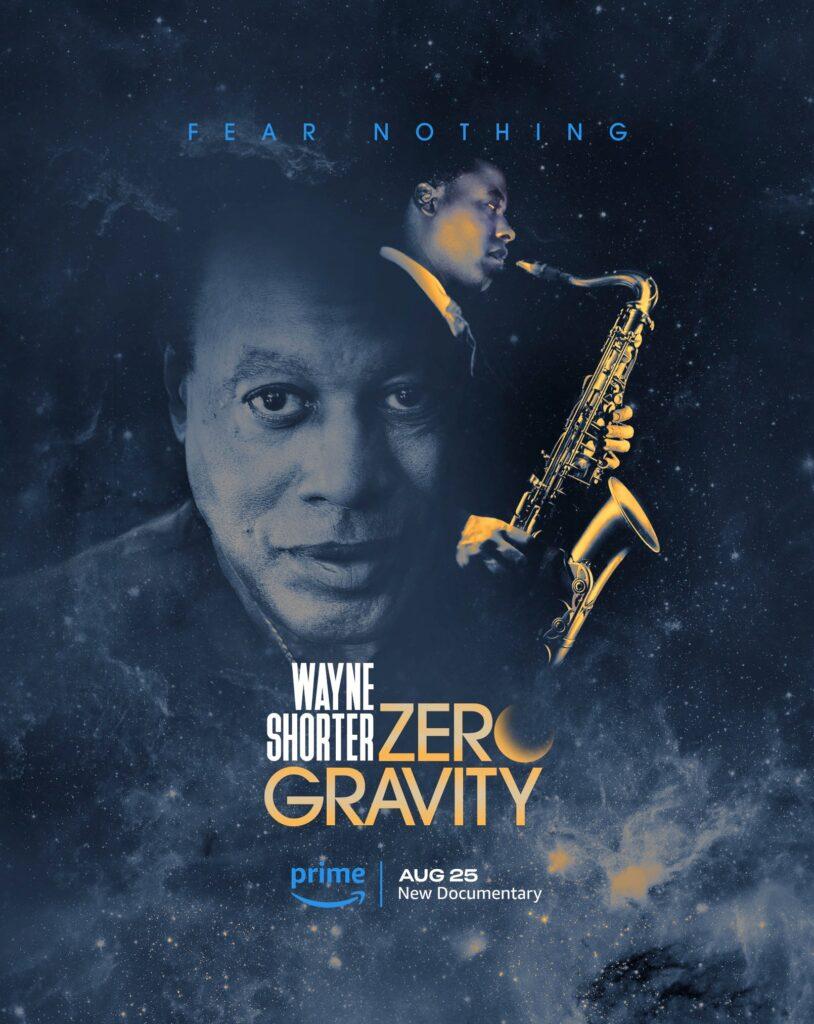 Carlos Santana – Guitar Hero
Carlos Santana – Guitar Hero
Scott: You met Wayne when Weather Report opened for Santana in the mid-`70s. How did that come about?
Santana became highly successful because of (legendary concert promoter) Mr. Bill Graham and (former Columbia Records executive) Clive Davis. When they, especially Bill, said we were big enough to choose whoever we wanted to open for us, we said, ‘WEATHER REPORT” – with specificity and clarity…a set design move. I offered them a lot of respect and space.
When I met Wayne, I was well aware of Wayne. I was just starting to dive into Wayne as a person who articulated the same language as John Coltrane, only in a different way. After hearing his album, Super Nova (Blue Note – 1969), it was like discovering multi-dimensional spectrums and spheres. Instead of the 3rd dimension which is very linear, the 5th dimension is being everywhere – yesterday, today and tomorrow – and any place you want to be. That’s vast…
Scott: Then in 1980, under the name Devadip Carlos Santana, you stepped away from the Latin Rock of the Santana band to record an audiophile double-LP of World Jazz-Rock Fusion entitled The Swing of Delight that featured Wayne Shorter, Herbie Hancock, Tony Williams, and Ron Carter among other amazing musicians. What are your memories of those sessions?
There’s a part of me that is so free from not being in my mind that I’m able to go into a situation, essentially, with Miles Davis’ band. If I was ‘normal,’ I would be scared to death. Because I’m not normal, it’s like sharing a sandwich or bringing orange juice to somebody. You just have a conversation. Wayne used to say, ‘Carlos and I are like two kids in a sandbox. He brings the bucket and I bring the shovel.’ The more we talk about Wayne, the more we understand that he is multi-dimensional. This means he’s deeply expansive and aware of how left and right you can go and how ahead and back. (Senior Santana percussionist) Armando Peraza used to call Wayne, Herbie, and Miles ‘harmonic geniuses.’
There’s a place that is very refreshing when someone takes you out of your mind – a mind so stuck in painting with the same canvas and frame…the same subject and conversation. In other words, you’re very predictable and pathetic. So just at that time when even you are boring you, here comes Wayne who says one or two words that open up a whole new world…and you feel like a 7-year-old child with a lot of vitality and a thirst for adventure.
Scott: I’ve always perceived you to be similarly spiritual yet earthy. Did Wayne help bring that out of you or were you already ‘there’ when you met?
I was already there because I was told by Alice Coltrane many years earlier. She said, “Carlos?” I said, “Yes Turiya.” “Walk like one of us because you are one of us.” When she said that, I’m picturing Coltrane and Wayne and Miles…Stravinski and Da Vinci. I’m thinking this other level that’s not pedestrian. There’s nothing wrong with pedestrian but that means you put a lid on your genius. Everybody is born genius. Everyone. But they ‘de-geni-ize’ you to ‘cooperate.’ See, there’s no way to de-geni-ize Wayne. He breaks the machines.
Scott: What will you be playing Wednesday night to honor Wayne?
We’re going to do “Sanctuary.” I played 22 concerts with Wayne in the Summer of `88. One time after about a week into the tour during a Full Moon in Barcelona to a packed house, when Wayne went into “Sanctuary,” his veins started popping out like he was an extraterrestrial being. He was playing so hard that Patrice Rushen snatched her hands off her keyboard as if it was a hot stove! “C.T.” (organist Chester Thompson) did the same thing. All of a sudden, everybody stopped playing except for Wayne and Ndugu on drums, Wayne went to a place like the Spanish bullfighter, Manolete. He put one knee on the floor…and was blowin’!
On the way back to the hotel, I said, ‘Wayne, may I ask you something?’ He said, ‘You may.” I said, “’Sanctuary’ tonight…what was that about?” He said, “I’m so glad you asked. I was being very cognizant this night, I decided to channel Bird, Dexter, Coltrane – all at once.”
I am not the body I am free,
I Am still as God created me
Purity innocence and power of understanding
The language of the unknown and unpredictability
Top 3: “Infant Eyes,” “Sanctuary,” “Face On The Barroom Floor (private live tape)”
Researched, interviewed, written and edited by A. Scott Galloway
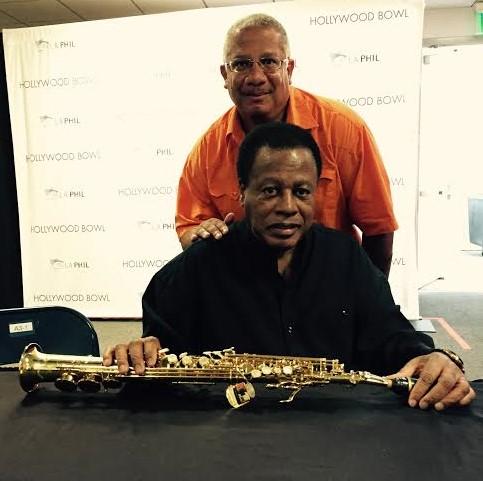
Suggested Reading:
“Footprints; The Life and Work of Wayne Shorter – Michelle Mercer (Tarcher/Penguin – 2004)
“Elegant People: A History of The Band Weather Report” – Curt Bianchi (Backbeat Books – 2021)
“No Beethoven – An Autobiography & Chronicle of Weather Report” – Peter Erskine (Fuzz/E/Books – 2013)
MORE NEWS ON EURWEB: Stars to Honor Quincy Jones at 90th Birthday Tribute at Hollywood Bowl
We Publish News 24/7. Don’t Miss A Story. Click HERE to SUBSCRIBE to Our Newsletter Now!
